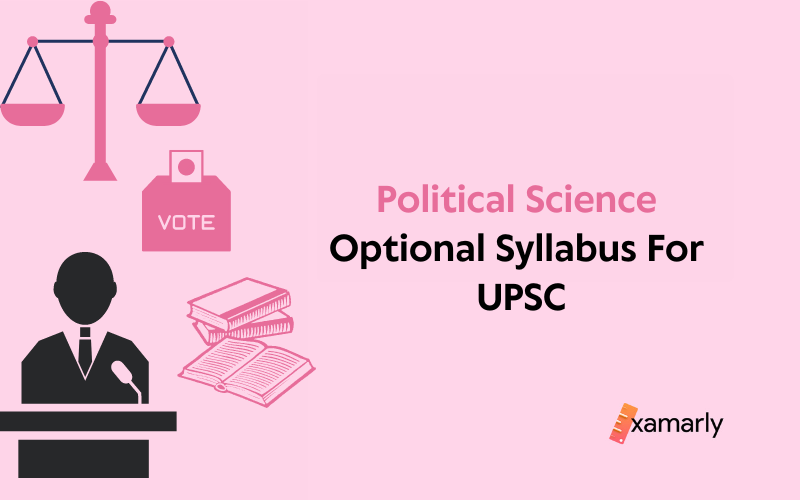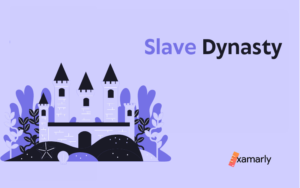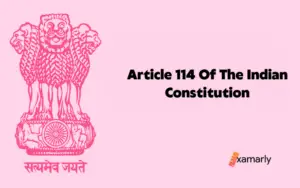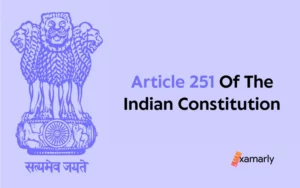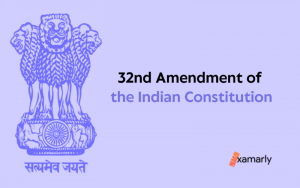Political Science and International Relations is one of the most liked and popular UPSC optional subjects. If you want to work in government, understanding a complex subject like political science and international relations is one of the most useful things you can do.
However, you should be extremely interested in a subject before choosing it as an optional. If you’re interested in political science, be sure to carefully examine the UPSC political science optional curriculum.
Political science optional syllabus for UPSC mainly consists of two paper. These are elaborated below.
Political Science Optional Syllabus For UPSC Paper-1
UPSC Political Science syllabus for UPSC Paper 1 has been divided into 2 parts- Section A is Political Theory and Indian Politics. Section B is named as The Indian Government and Politics. Given below is the section-wise syllabus of both sections.
Section A – Political Theory And Indian Politics
- Political theory: its purposes and methods.
- Theories of the state.
- Justice: Conceptions of justice, particularly in light of Rawl’s theory of justice and the communitarian criticisms it has received.
- Social, political, and economic equality and how are these related, their definitions and theories; the various categories of rights; and the notion of human rights.
- Classical and modern views of democracy; various kinds of democracy, including representative, participatory, and deliberative.
- Hegemony, ideology, and legitimacy are three concepts of power.
- Political Ideologies like Liberalism, Feminism, etc.
- Indian political thinkers like Dharmashastra, Arthashastra, and Buddhist traditions.
- Western political thought of Aristotle, Hobbes, Machiavelli, Locke, etc.
Section B: Indian Government And Politics
- Indian Nationalism: The political tactics used by India in its fight for independence range from constitutionalism to widespread satyagraha, non-cooperation, and civil disobedience, as well as militant and revolutionary movements, as well as peasant and workers’ movements.
- Perspectives on Indian National Movement.
- Different social and political viewpoints of Dalits.
- British legacy and the Creation of the Indian Constitution.
- The Preamble, Fundamental Rights and Duties.
- Directive Principles, Parliamentary System and Amendment Procedures.
- Grassroots Democracy and The Importance of the 73rd and 74th Amendments.
- Institutions/Commissions that are required by law include the Election Commission, the Comptroller and Auditor General, the Finance Commission, the Union Public Service Commission, the National Commissions for Scheduled Castes and Tribes, the National Commission for Women, the National Human Rights Commission, the National Commission for Minorities, and the National Commission for Backward Classes.
- Federalism: Constitutional provisions, changing behaviour/nature of centre-state relations. Integrationist tendencies and regional aspirations, and inter-state disputes.
- Planning and Economic Development: Nehruvian and Gandhian perspectives
- The role of planning and the public sector.
- The Green Revolution, land reforms, and agrarian relations.
- Liberalization and economic reforms.
- Caste, Religion, and Ethnicity in Indian Politics.
- Party System: National and regional political parties, their ideologies and sociological foundations, coalition-building strategies, pressure groups, patterns of voting behavior, and the shifting socioeconomic makeup of legislators.
- Social movements.\
Related – A Complete Guide On How To Prepare For Indian Polity For UPSC CSE
UPSC Political Science Optional Syllabus For Paper-2
UPSC Political Science syllabus for Paper 2 has again been divided into 2 parts- Section A is Comparative Political Analysis and International Politics. Section B consists of India and the world. Given below is the section-wise syllabus of both sections.
Section A: The Comparative Political Analysis And International Politics
- Political economy and political sociology views; nature and main methodologies; comparative politics constraints.
- Comparative analysis of the state: the traits and evolving character of the state in capitalism and socialist economies, as well as in developed and underdeveloped communities.
- Political parties, interest groups, and social movements in developed and developing cultures are all examples of politics of representation and participation.
- Approaches to the Study of International Relations.
- Globalisation and Key concepts in International Relations. These cover the nation’s interest, power and security, deterrence and the power dynamic, international actors and collective security, globalization, and the global capitalist system.
- International political order is shifting. It encompasses the emergence of superpowers, ideological and strategic polarisation, the arms race, the cold war, and the nuclear threat. The non-aligned movement’s objectives and successes, the fall of the Soviet Union, unipolarity and American hegemony, and the relevance of non-alignment in the modern world are all included.
- The WTO, socialist economies, and the CMEA (Council for Mutual Economic Assistance), the development of the international economic system. Demands from the Third World for a new global economic system; economic globalization.
- United Nations: envisioned role and actual performance; objectives and operations of specialized UN organizations; requirement for UN changes.
- Regionalisation of World Politics.
- Global concerns at the moment like human rights, ecology, and nuclear proliferation.
Section B: India And The World
- Indian Foreign Policy: The factors that influence it, the institutions that shape it, and its continuities and changes.
- India’s Contribution to the Non-Alignment Movement.
- India and South Asia:
- SAARC-past performance and future prospects.
- South Asia as a Free Trade Area.
- India’s “Look East” policy.
- River water disputes, illicit border crossing, ethnic wars and insurgencies, et.c
- India and the Global South.
- India and the Global Centres of Power.
- India and the UN System.
- India and the Nuclear Question: Changing perceptions and policy.
- With regard to the current problems in Afghanistan, Iraq, and West Asia, as well as its growing connections with the US and Israel and its vision for a new international order, India’s foreign policy has recently changed.
See Also – How is Political Science as an Optional for UPSC? Pros & Cons of Selecting Political Science
Booklist For Political Science Optional For UPSC
When it comes to preparing for the subject then there is a lot of study material available online as well as offline. So, here is a list of the resources that would be best suitable for your PSIR preparation.
Paper 1, Part A
- An Introduction to Political Theory by O.P Gauba
- Political Ideologies by Andrew Heywood
- Indian Political Thoughts by VR Mehta
- Fifty major political thinkers: Routledge Publication
- Youtube channels – Philosophy Tube and The School of Life
Paper 1, Part B
- An introduction to constitution – DD Basu (especially for the topics Fundamental Rights and Centre-State Relations)
- Indian Polity – Laxmikanth
- An Oxford companion to politics in India-Niraja Gopal Jayal and Pratap Bhanu Mehta (Do not read page by page – only portions mentioned in the syllabus)
- India’s Struggle For Independence – Bipan Chandra
- Indian Government and Politics – B L Fadia
Paper 2, Part A
- Global politics- Andrew Heywood
- IGNOU MPS Material: MPS-04
- 50 Key Thinkers in International Relations: Routledge Publication
Paper 2, Part B
- Does the Elephant Dance?: Contemporary Indian Foreign Policy – David M. Malone
Summing Up
Hence, we conclude that Political Science can be a very interesting subject if backed up by the interest of the aspirant. Understanding the political framework can be a very useful skills one can acquire in his life. Moreover, we all live in in some sort of political society so it would indeed help us to make our social and political decisions better.


